Related Research Articles
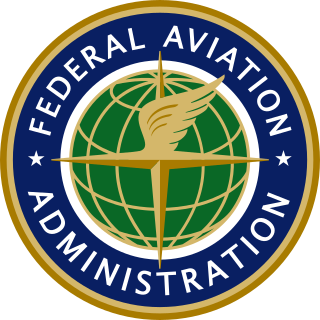
The Federal Aviation Administration (FAA) is a U.S. federal government agency within the U.S. Department of Transportation which regulates civil aviation in the United States and surrounding international waters. Its powers include air traffic control, certification of personnel and aircraft, setting standards for airports, and protection of U.S. assets during the launch or re-entry of commercial space vehicles. Powers over neighboring international waters were delegated to the FAA by authority of the International Civil Aviation Organization.
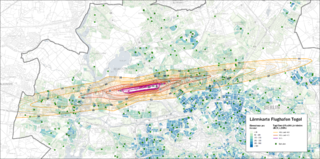
Aircraft noise pollution refers to noise produced by aircraft in flight that has been associated with several negative stress-mediated health effects, from sleep disorders to cardiovascular disorders. Governments have enacted extensive controls that apply to aircraft designers, manufacturers, and operators, resulting in improved procedures and cuts in pollution.

Climate change mitigation (or decarbonisation) is action to limit the greenhouse gases in the atmosphere that cause climate change. Climate change mitigation actions include conserving energy and replacing fossil fuels with clean energy sources. Secondary mitigation strategies include changes to land use and removing carbon dioxide (CO2) from the atmosphere. Current climate change mitigation policies are insufficient as they would still result in global warming of about 2.7 °C by 2100, significantly above the 2015 Paris Agreement's goal of limiting global warming to below 2 °C.
The Aviation Environment Federation (AEF) is the principal UK non-profit making organisation concerned with the environmental effects of aviation. These range from aviation noise issues associated with small airstrips or helipads to the contribution of airline emissions to global warming and climate change. The AEF is widely quoted in international media as a source of research and analysis on issues related to aviation and the environment.

Aircraft engines produce gases, noise, and particulates from fossil fuel combustion, raising environmental concerns over their global effects and their effects on local air quality. Jet airliners contribute to climate change by emitting carbon dioxide, the best understood greenhouse gas, and, with less scientific understanding, nitrogen oxides, contrails and particulates. Their radiative forcing is estimated at 1.3–1.4 that of CO2 alone, excluding induced cirrus cloud with a very low level of scientific understanding. In 2018, global commercial operations generated 2.4% of all CO2 emissions.
The Next Generation Air Transportation System (NextGen) is the current U.S. Federal Aviation Administration (FAA) program to modernize the National Airspace System (NAS). The FAA began work on NextGen improvements in 2007 and plans to finish implementation by 2030. Modernization goals include using new technologies and procedures to increase NAS safety, efficiency, capacity, access, flexibility, predictability, and resilience while reducing aviation's environmental impact.
Hypermobile travelers are "highly mobile individuals" who take "frequent trips, often over great distances." They "account for a large share of the overall kilometres travelled, especially by air." These people contribute significantly to the overall amount of air miles flown within a given society. Although concerns over hypermobility apply to several modes of transport, the environmental impact of aviation and especially its greenhouse gas emissions have brought particular focus on flying. Among the reasons for this focus is that these emissions, because they are made at high altitude, have a climate impact that is commonly estimated to be 2.7 higher, than the same emissions if made at ground-level.
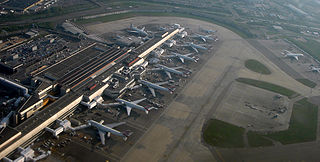
Air transport in the United Kingdom is the commercial carriage of passengers, freight and mail by aircraft, both within the United Kingdom (UK) and between the UK and the rest of the world. In the past 25 years the industry has seen continuous growth, and the demand for passenger air travel in particular is forecast to increase from the current level of 236 million passengers to 465 million in 2030. One airport, Heathrow Airport, is amongst the top ten busiest airports in the world. More than half of all passengers travelling by air in the UK currently travel via the six London area airports. Outside London, Manchester Airport is by far the largest and busiest of the remaining airports, acting as a hub for the 20 million or so people who live within a two-hour drive. Regional airports have experienced the most growth in recent years, due to the success of low-cost carrier airlines over the last decade.

The environmental impact of aviation in the United Kingdom are increasing due to the increasing demand for air travel in the country. In the past 25 years the UK air transport industry has seen sustained growth, and the demand for passenger air travel in particular is forecast to increase more than twofold, to 465 million passengers, by 2030. Two airports; London Heathrow and London Gatwick, are amongst the top ten busiest airports in the world for international passenger traffic. Whilst more than half of all passengers travelling by air in the UK currently travel via the five London area airports, regional airports have experienced the most growth in recent years, due to the success of 'no-frills' airlines over the last decade.
AirportWatch is an environmental group which campaigns for sustainable air transport through reduction or redistribution of demand, determined by either timing or location.

The Air Transport Action Group (ATAG) is a coalition of aviation industry experts focusing on sustainable development issues. Its board of directors is composed of senior representatives from trade associations like Airports Council International, Civil Air Navigation Services Organisation, International Air Transport Association, Airlines for America and Association of Asia Pacific Airlines, plus aircraft manufacturers like Airbus, ATR, Boeing, Bombardier Aerospace, CFM International, Embraer, Honeywell Aerospace, Pratt & Whitney, Rolls-Royce plc and Safran.
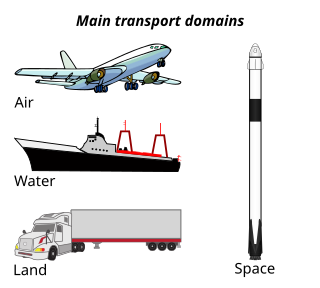
Transport or transportation is the intentional movement of humans, animals, and goods from one location to another. Modes of transport include air, land, water, cable, pipelines, and space. The field can be divided into infrastructure, vehicles, and operations. Transport enables human trade, which is essential for the development of civilizations.

The aircraft design process is a loosely defined method used to balance many competing and demanding requirements to produce an aircraft that is strong, lightweight, economical and can carry an adequate payload while being sufficiently reliable to safely fly for the design life of the aircraft. Similar to, but more exacting than, the usual engineering design process, the technique is highly iterative, involving high-level configuration tradeoffs, a mixture of analysis and testing and the detailed examination of the adequacy of every part of the structure. For some types of aircraft, the design process is regulated by civil airworthiness authorities.
Aviation engineering is a branch of engineering which deals with airspace development, airport design, aircraft navigation technologies, and aerodrome planning. It also involves the formulation of public policy, regulations, aviation laws pertaining to airspace, airlines, airports, aerodromes and the conduct of air services agreements through treaty.
The International Board for Research into Aircraft Crash Events (IBRACE) was founded on 21 November 2016 by a group of subject-matter experts in aviation, engineering, clinical medicine, and human factors. These experts are associated with organizations that include the Civil Aerospace Medical Institute, USA (CAMI); Cranfield University, England; GRM Consulting Ltd., England; Spire Liverpool Hospital, England; TÜV Rheinland, Germany; the University of Calgary, Canada; the University of Nottingham, England; and Wonkwang University, Korea.
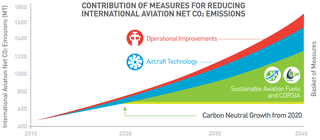
The Carbon Offsetting and Reduction Scheme for International Aviation (CORSIA) is a carbon offset and carbon reduction scheme to lower CO2 emissions for international flights and curb the aviation impact on climate change. CORSIA uses market-based environmental policy instruments to offset CO2 emissions: aircraft operators have to purchase carbon credits from the carbon market.

Alice Larkin is a British climate scientist. She serves as Professor of Climate Science and Energy Policy in the School of Engineering at the University of Manchester. She works on carbon budgets, international transport and cumulative emissions.

Types of aviation taxation and subsidies, and implementations, are listed below. Taxation is one of several methods to mitigate the environmental impact of aviation.
Deutsche Regional Aircraft GmbH is a German aircraft manufacturer based in the village of Oberpfaffenhofen, Germany.

Air travel demand mitigation or aviation demand reduction or air travel demand reduction is a part of transportation demand management and climate change mitigation.